Deck 7: The Skeletal System: the Axial Skeleton
Question
Question
Question
Question
Question
Question
Question
Question
Question
Question
Question
Question
Question
Question
Question
Question
Question
Question
Question
Question
Question
Question
Question
Question
Question
Question
Question
Question
Question
Question
Question
Question
Question
Question
Question
Question
Question
Question
Question
Question
Question
Question
Question
Question
Question
Question
Question
Question
Question
Question
Question
Question
Question
Question
Question
Question
Question
Question
Question
Question
Question
Question
Question
Question
Question
Question
Question
Question
Question
Question
Question
Question
Question
Question
Question

Unlock Deck
Sign up to unlock the cards in this deck!
Unlock Deck
Unlock Deck
1/75
Play
Full screen (f)
Deck 7: The Skeletal System: the Axial Skeleton
1
Which best describes the occipital bone?
A) part of the bridge of the nose
B) bears condyles that form the atlanto-occipital joints
C) inferior and posterior portion of nasal septum
D) includes temporal process of zygomatic arch
E) sella turcica protects the pituitary gland
A) part of the bridge of the nose
B) bears condyles that form the atlanto-occipital joints
C) inferior and posterior portion of nasal septum
D) includes temporal process of zygomatic arch
E) sella turcica protects the pituitary gland
B
2
The ethmoid bone does NOT contain
A) olfactory foramina
B) crista galli
C) cribriform plate
D) inferior nasal conchae
A) olfactory foramina
B) crista galli
C) cribriform plate
D) inferior nasal conchae
D
3
Which of the following is false for paranasal sinuses? They are
A) lined with mucous membranes
B) chambers for voice resonance
C) located in zygomatic bones
D) paired cavities
A) lined with mucous membranes
B) chambers for voice resonance
C) located in zygomatic bones
D) paired cavities
C
4
The mandible has condylar processes and coronoid processes.
A) Both are articular in function.
B) Both are for muscle attachment.
C) The condylar process is articular; the coronoid process is for muscle attachment.
D) The condylar process is for muscle attachment; the coronoid process is articular.
A) Both are articular in function.
B) Both are for muscle attachment.
C) The condylar process is articular; the coronoid process is for muscle attachment.
D) The condylar process is for muscle attachment; the coronoid process is articular.

Unlock Deck
Unlock for access to all 75 flashcards in this deck.
Unlock Deck
k this deck
5
Which best describes the sphenoid bone?
A) forms part of the bridge of the nose
B) bears condyles that form the atlanto-occipital joints
C) inferior and posterior portion of nasal septum
D) includes temporal process of zygomatic arch
E) sella turcica protects the pituitary gland
A) forms part of the bridge of the nose
B) bears condyles that form the atlanto-occipital joints
C) inferior and posterior portion of nasal septum
D) includes temporal process of zygomatic arch
E) sella turcica protects the pituitary gland

Unlock Deck
Unlock for access to all 75 flashcards in this deck.
Unlock Deck
k this deck
6
Which best describes the lacrimal bone?
A) forms part of the bridge of the nose
B) superior portion of nasal septum
C) inferior and posterior portion of nasal septum
D) includes temporal process of zygomatic arch
E) houses a structure that gathers tears
A) forms part of the bridge of the nose
B) superior portion of nasal septum
C) inferior and posterior portion of nasal septum
D) includes temporal process of zygomatic arch
E) houses a structure that gathers tears

Unlock Deck
Unlock for access to all 75 flashcards in this deck.
Unlock Deck
k this deck
7
Which portion of a vertebra DOES NOT surround the spinal cord to keep it protected from injury?
A) body
B) pedicle
C) lamina
D) transverse process
A) body
B) pedicle
C) lamina
D) transverse process

Unlock Deck
Unlock for access to all 75 flashcards in this deck.
Unlock Deck
k this deck
8
"Sutures" would be found connecting which bones?
A) mandible and hyoid
B) temporal and mandible
C) sphenoid and ethmoid
D) frontal and occipital
A) mandible and hyoid
B) temporal and mandible
C) sphenoid and ethmoid
D) frontal and occipital

Unlock Deck
Unlock for access to all 75 flashcards in this deck.
Unlock Deck
k this deck
9
The girdles attach the limbs (extremities) to the axial skeleton. The girdles are considered to be part of the axial skeleton.
A) Both statements are true.
B) Both statements are false.
C) The first statement is true; the second is false.
D) The second statement is true; the first is false.
A) Both statements are true.
B) Both statements are false.
C) The first statement is true; the second is false.
D) The second statement is true; the first is false.

Unlock Deck
Unlock for access to all 75 flashcards in this deck.
Unlock Deck
k this deck
10
The bone that consists of five fused bones, is triangular, and serves as one of the boundaries of the pelvic cavity is the:
A) coccyx
B) manubrium
C) coxal bone
D) sacrum
A) coccyx
B) manubrium
C) coxal bone
D) sacrum

Unlock Deck
Unlock for access to all 75 flashcards in this deck.
Unlock Deck
k this deck
11
Which best describes the palatine bone?
A) horizontal plate forms the posterior portion of the hard palate
B) superior portion of nasal septum
C) inferior and posterior portion of nasal septum
D) includes temporal process of zygomatic arch
E) houses a structure that gathers tears
A) horizontal plate forms the posterior portion of the hard palate
B) superior portion of nasal septum
C) inferior and posterior portion of nasal septum
D) includes temporal process of zygomatic arch
E) houses a structure that gathers tears

Unlock Deck
Unlock for access to all 75 flashcards in this deck.
Unlock Deck
k this deck
12
Membrane-filled spaces between cranial bones of an infant skull are called:
A) sutures
B) sinuses
C) fontanels
D) foramina
A) sutures
B) sinuses
C) fontanels
D) foramina

Unlock Deck
Unlock for access to all 75 flashcards in this deck.
Unlock Deck
k this deck
13
The fifth cranial nerve (trigeminal nerve) provides sensory information from the face. The three branches of the trigeminal nerve pass from the periphery of the face to the brain through three separate foramina. Which cranial bone contains the foramina for passage of branches of the trigeminal (V) nerve?
A) ethmoid
B) temporal
C) sphenoid
D) occipital
A) ethmoid
B) temporal
C) sphenoid
D) occipital

Unlock Deck
Unlock for access to all 75 flashcards in this deck.
Unlock Deck
k this deck
14
The frontal bone
A) contributes to the sagittal suture
B) forms part of the floor of the orbit
C) articulates with the mandible
D) none of these choices
A) contributes to the sagittal suture
B) forms part of the floor of the orbit
C) articulates with the mandible
D) none of these choices

Unlock Deck
Unlock for access to all 75 flashcards in this deck.
Unlock Deck
k this deck
15
Which best describes the maxilla bone?
A) lower jaw bone
B) superior portion of nasal septum
C) inferior and posterior portion of nasal septum
D) palatine process forms most of the hard palate
E) contains the carotid and jugular foramina
A) lower jaw bone
B) superior portion of nasal septum
C) inferior and posterior portion of nasal septum
D) palatine process forms most of the hard palate
E) contains the carotid and jugular foramina

Unlock Deck
Unlock for access to all 75 flashcards in this deck.
Unlock Deck
k this deck
16
Intercostal spaces
A) are filled by costal cartilages
B) contain muscles, blood vessels, and nerves
C) are grooves on the inner surfaces of ribs
D) contain bone marrow
A) are filled by costal cartilages
B) contain muscles, blood vessels, and nerves
C) are grooves on the inner surfaces of ribs
D) contain bone marrow

Unlock Deck
Unlock for access to all 75 flashcards in this deck.
Unlock Deck
k this deck
17
The fifth intercostal space will be palpated between
A) ribs 4 and 5
B) ribs 5 and 6
C) rib 4 and T4
D) rib 5 and T5
A) ribs 4 and 5
B) ribs 5 and 6
C) rib 4 and T4
D) rib 5 and T5

Unlock Deck
Unlock for access to all 75 flashcards in this deck.
Unlock Deck
k this deck
18
Which best describes the vomer bone?
A) forms part of the bridge of the nose
B) superior portion of nasal septum
C) inferior and posterior portion of nasal septum
D) palatine process forms most of the hard palate
E) contains the carotid and jugular foramina
A) forms part of the bridge of the nose
B) superior portion of nasal septum
C) inferior and posterior portion of nasal septum
D) palatine process forms most of the hard palate
E) contains the carotid and jugular foramina

Unlock Deck
Unlock for access to all 75 flashcards in this deck.
Unlock Deck
k this deck
19
What pair of skull bones contributes to the only freely movable joint of the head?
A) temporal and mandible
B) zygomatic and maxilla
C) frontal and sphenoid
D) sphenoid and ethmoid
A) temporal and mandible
B) zygomatic and maxilla
C) frontal and sphenoid
D) sphenoid and ethmoid

Unlock Deck
Unlock for access to all 75 flashcards in this deck.
Unlock Deck
k this deck
20
Which skull bone contains the mandibular fossa, mastoid process, styloid process, and zygomatic process?
A) temporal
B) parietal
C) zygomatic
D) occipital
A) temporal
B) parietal
C) zygomatic
D) occipital

Unlock Deck
Unlock for access to all 75 flashcards in this deck.
Unlock Deck
k this deck
21
The illustrated bone is the _____? 
A) atlas
B) hyoid bone
C) axis
D) vomer

A) atlas
B) hyoid bone
C) axis
D) vomer

Unlock Deck
Unlock for access to all 75 flashcards in this deck.
Unlock Deck
k this deck
22
The cervical curve is convex anteriorly.

Unlock Deck
Unlock for access to all 75 flashcards in this deck.
Unlock Deck
k this deck
23
The three main parts of the sternum are manubrium, xiphoid process and sternal angle.

Unlock Deck
Unlock for access to all 75 flashcards in this deck.
Unlock Deck
k this deck
24
The superior and inferior nuchal lines are sites of muscle attachment on the occipital bone.

Unlock Deck
Unlock for access to all 75 flashcards in this deck.
Unlock Deck
k this deck
25
The body of a typical thoracic vertebrae
A) articulates with costal cartilages.
B) contains transverse foramina.
C) body has articular surfaces called demifacets.
D) has no body and no spinous process.
E) has a peg-like process called a dens.
A) articulates with costal cartilages.
B) contains transverse foramina.
C) body has articular surfaces called demifacets.
D) has no body and no spinous process.
E) has a peg-like process called a dens.

Unlock Deck
Unlock for access to all 75 flashcards in this deck.
Unlock Deck
k this deck
26
Which best describes the term lordosis?
A) lateral bending of the vertebral column
B) exaggeration of the cervical curve
C) exaggeration of the thoracic curve
D) exaggeration of the lumbar curve
E) congenital defect in which the laminae fail to unite at the midline
A) lateral bending of the vertebral column
B) exaggeration of the cervical curve
C) exaggeration of the thoracic curve
D) exaggeration of the lumbar curve
E) congenital defect in which the laminae fail to unite at the midline

Unlock Deck
Unlock for access to all 75 flashcards in this deck.
Unlock Deck
k this deck
27
The atlanto-axial joint allows for nodding the head to say yes.

Unlock Deck
Unlock for access to all 75 flashcards in this deck.
Unlock Deck
k this deck
28
The lateral walls of the nasal cavity are formed by the ethmoid, maxillae, and inferior nasal conchae.

Unlock Deck
Unlock for access to all 75 flashcards in this deck.
Unlock Deck
k this deck
29
Which best describes the atlas?
A) has small bodies
B) has four foramina
C) body has articular surfaces called facets and demifacets
D) has no body and no spinous process
E) has a peg-like process called a dens
A) has small bodies
B) has four foramina
C) body has articular surfaces called facets and demifacets
D) has no body and no spinous process
E) has a peg-like process called a dens

Unlock Deck
Unlock for access to all 75 flashcards in this deck.
Unlock Deck
k this deck
30
The seventh cervical vertebra is called the vertebra prominens.

Unlock Deck
Unlock for access to all 75 flashcards in this deck.
Unlock Deck
k this deck
31
Which best describes a lumbar vertebra?
A) has a small body
B) has four foramina
C) body has articular surfaces called demifacets
D) processes are thick and short
E) articulates with the hip bone
A) has a small body
B) has four foramina
C) body has articular surfaces called demifacets
D) processes are thick and short
E) articulates with the hip bone

Unlock Deck
Unlock for access to all 75 flashcards in this deck.
Unlock Deck
k this deck
32
Which best describes a typical cervical vertebra?
A) has a larger body than a thoracic vertebra
B) contains transverse foramina
C) body has articular surfaces called facets and demifacets
D) has no body, no spinous process
E) has a peg-like process called a dens
A) has a larger body than a thoracic vertebra
B) contains transverse foramina
C) body has articular surfaces called facets and demifacets
D) has no body, no spinous process
E) has a peg-like process called a dens

Unlock Deck
Unlock for access to all 75 flashcards in this deck.
Unlock Deck
k this deck
33
Which best describes the term spina bifida?
A) lateral bending of the vertebral column
B) exaggeration of the cervical curve
C) exaggeration of the thoracic curve
D) exaggeration of the lumbar curve
E) congenital defect in which the laminae fail to unite at the midline
A) lateral bending of the vertebral column
B) exaggeration of the cervical curve
C) exaggeration of the thoracic curve
D) exaggeration of the lumbar curve
E) congenital defect in which the laminae fail to unite at the midline

Unlock Deck
Unlock for access to all 75 flashcards in this deck.
Unlock Deck
k this deck
34
The maxillae articulate with every facial bone except the mandible.

Unlock Deck
Unlock for access to all 75 flashcards in this deck.
Unlock Deck
k this deck
35
What type of vertebra is shown in here? 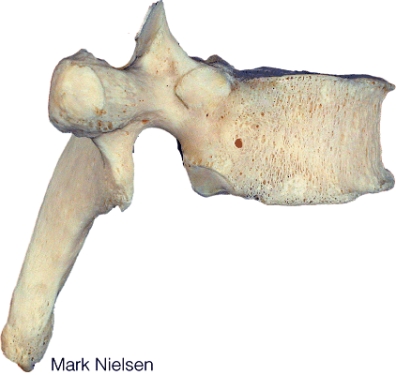
A) cervical
B) thoracic
C) lumbar
D) sacral

A) cervical
B) thoracic
C) lumbar
D) sacral

Unlock Deck
Unlock for access to all 75 flashcards in this deck.
Unlock Deck
k this deck
36
The mandible articulates with the mandibular fossa of the occipital bone.

Unlock Deck
Unlock for access to all 75 flashcards in this deck.
Unlock Deck
k this deck
37
A sacral ala articulates with a hip bone to form a sacroiliac joint.

Unlock Deck
Unlock for access to all 75 flashcards in this deck.
Unlock Deck
k this deck
38
The posterior fontanel is at the junction of the future lambdoid and sagittal sutures.

Unlock Deck
Unlock for access to all 75 flashcards in this deck.
Unlock Deck
k this deck
39
Which best describes the term scoliosis?
A) lateral bending of the vertebral column
B) exaggeration of the cervical curve
C) exaggeration of the thoracic curve
D) exaggeration of the lumbar curve
E) congenital defect in which the laminae fail to unite at the midline
A) lateral bending of the vertebral column
B) exaggeration of the cervical curve
C) exaggeration of the thoracic curve
D) exaggeration of the lumbar curve
E) congenital defect in which the laminae fail to unite at the midline

Unlock Deck
Unlock for access to all 75 flashcards in this deck.
Unlock Deck
k this deck
40
The nasal septum consists of septal cartilage plus portions of the maxillae and vomer.

Unlock Deck
Unlock for access to all 75 flashcards in this deck.
Unlock Deck
k this deck
41
The hard palate is a bony partition formed by the _____ and the _____ bones.

Unlock Deck
Unlock for access to all 75 flashcards in this deck.
Unlock Deck
k this deck
42
The superior part of the nasal septum, the middle nasal conchae, and the crista galli are formed by the _____ bone.

Unlock Deck
Unlock for access to all 75 flashcards in this deck.
Unlock Deck
k this deck
43
If a squamous suture were separated (opened up), a parietal bone would be pulled away from a _____ bone.

Unlock Deck
Unlock for access to all 75 flashcards in this deck.
Unlock Deck
k this deck
44
The two bones that form the zygomatic arch are the _____ and the _____ bones.

Unlock Deck
Unlock for access to all 75 flashcards in this deck.
Unlock Deck
k this deck
45
Of the eight bones that form the cranium, only the _____ and _____ bones are paired bones.

Unlock Deck
Unlock for access to all 75 flashcards in this deck.
Unlock Deck
k this deck
46
List the foramina of the skull that provide passageways for cranial nerves or their main branches. Indicate the name of the skull bone in which each of the foramina is located.

Unlock Deck
Unlock for access to all 75 flashcards in this deck.
Unlock Deck
k this deck
47
The two major divisions of the skeletal system are _____ and _____.

Unlock Deck
Unlock for access to all 75 flashcards in this deck.
Unlock Deck
k this deck
48
List and number the bones in each region of the vertebral column.

Unlock Deck
Unlock for access to all 75 flashcards in this deck.
Unlock Deck
k this deck
49
Alveolar processes are features of three skull bones, namely the two _____ and the _____.

Unlock Deck
Unlock for access to all 75 flashcards in this deck.
Unlock Deck
k this deck
50
The _____ process of the temporal bone is a rounded projection posterior to the external auditory meatus that is a site of attachment for several neck muscles.

Unlock Deck
Unlock for access to all 75 flashcards in this deck.
Unlock Deck
k this deck
51
The illustrated bone is the _____ bone. 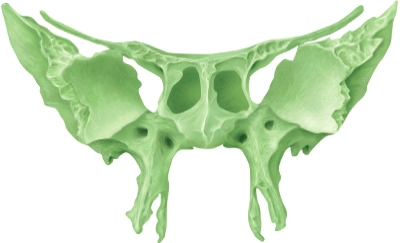


Unlock Deck
Unlock for access to all 75 flashcards in this deck.
Unlock Deck
k this deck
52
The illustrated bone is the _____. 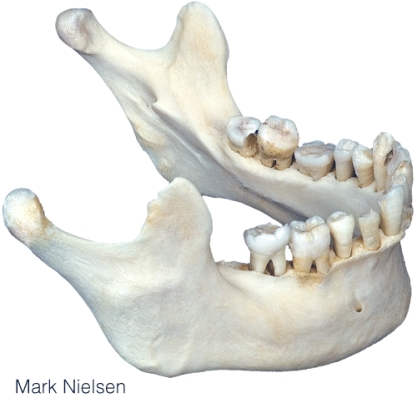


Unlock Deck
Unlock for access to all 75 flashcards in this deck.
Unlock Deck
k this deck
53
The _____ are convex surfaces on either side of the foramen magnum that articulate with the atlas.

Unlock Deck
Unlock for access to all 75 flashcards in this deck.
Unlock Deck
k this deck
54
Define, number, and locate vertebrosternal ribs, vertebrochondral ribs, and vertebral ribs.

Unlock Deck
Unlock for access to all 75 flashcards in this deck.
Unlock Deck
k this deck
55
The depression in the sphenoid bone known as the _____ is the location of the pituitary gland.

Unlock Deck
Unlock for access to all 75 flashcards in this deck.
Unlock Deck
k this deck
56
The cranial bones that contain no principal foramina are the _____ bones.

Unlock Deck
Unlock for access to all 75 flashcards in this deck.
Unlock Deck
k this deck
57
The first rib has grooves on its superior surface for the subclavian artery, subclavian vein and the inferior trunk of the brachial plexus.

Unlock Deck
Unlock for access to all 75 flashcards in this deck.
Unlock Deck
k this deck
58
Name the seven processes that are found on most vertebrae and state the function of each.

Unlock Deck
Unlock for access to all 75 flashcards in this deck.
Unlock Deck
k this deck
59
The illustrated bone is the _____ bone. 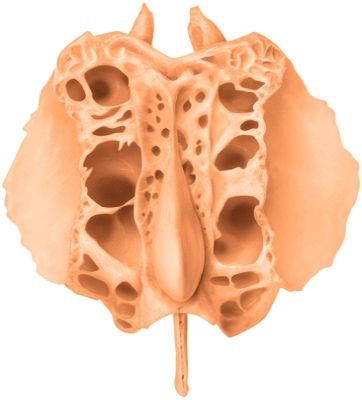


Unlock Deck
Unlock for access to all 75 flashcards in this deck.
Unlock Deck
k this deck
60
The _____ bone does not articulate with any other bones, but is a site of attachment for muscles of the tongue, pharynx and neck.

Unlock Deck
Unlock for access to all 75 flashcards in this deck.
Unlock Deck
k this deck
61
Paired spinal nerves pass through _____ foramina to carry information between the spinal cord and other parts of the body.

Unlock Deck
Unlock for access to all 75 flashcards in this deck.
Unlock Deck
k this deck
62
Which two cranial bones unite to form the lambdoid suture? 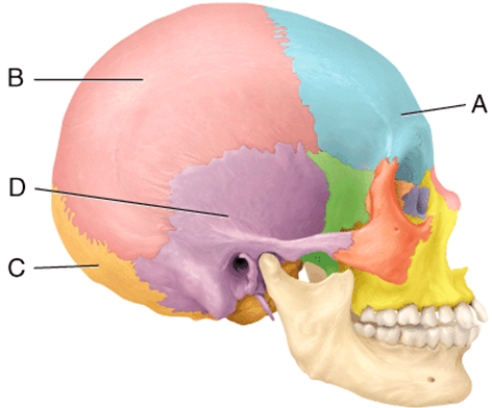
A) A and B
B) B and C
C) D and E
D) B and D
E) A and D

A) A and B
B) B and C
C) D and E
D) B and D
E) A and D

Unlock Deck
Unlock for access to all 75 flashcards in this deck.
Unlock Deck
k this deck
63
The label on the transverse process of the vertebra is _____. 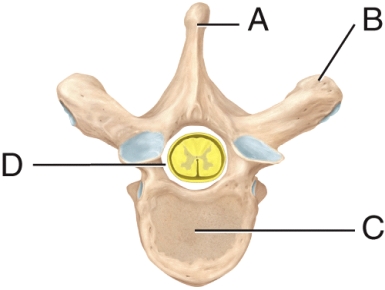
A) A
B) B
C) C
D) D

A) A
B) B
C) C
D) D

Unlock Deck
Unlock for access to all 75 flashcards in this deck.
Unlock Deck
k this deck
64
Where is the pituitary gland located? 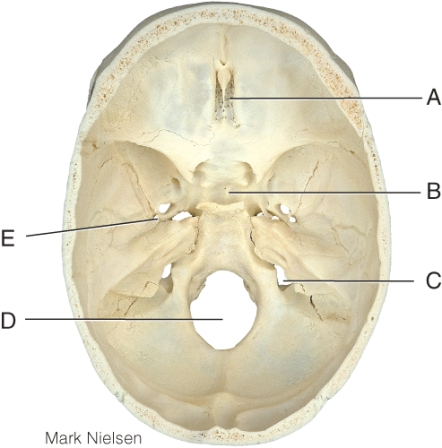
A) A
B) B
C) C
D) D
E) E

A) A
B) B
C) C
D) D
E) E

Unlock Deck
Unlock for access to all 75 flashcards in this deck.
Unlock Deck
k this deck
65
Where is the zygomatic bone? 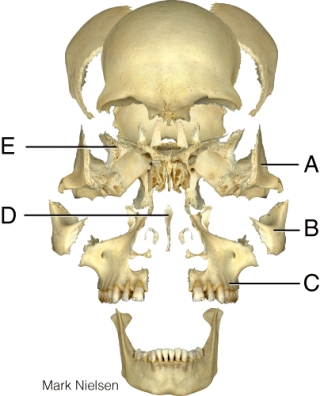
A) A
B) B
C) C
D) D
E) E

A) A
B) B
C) C
D) D
E) E

Unlock Deck
Unlock for access to all 75 flashcards in this deck.
Unlock Deck
k this deck
66
The _____ _______ of the sacrum provides an inferior entrance into the vertebral canal, a site often used for injection of anaesthetic agents during labor.

Unlock Deck
Unlock for access to all 75 flashcards in this deck.
Unlock Deck
k this deck
67
Identify the tubercle of the rib. 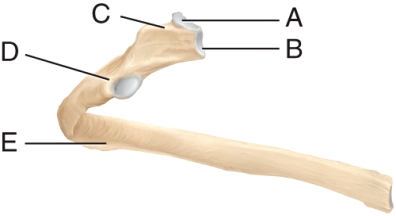
A) A
B) B
C) C
D) D
E) E

A) A
B) B
C) C
D) D
E) E

Unlock Deck
Unlock for access to all 75 flashcards in this deck.
Unlock Deck
k this deck
68
The _____ bones of the skull are involved in each of the four main sutures.

Unlock Deck
Unlock for access to all 75 flashcards in this deck.
Unlock Deck
k this deck
69
What region are these vertebrae from? 
A) cervical
B) thoracic
C) lumbar
D) sacral
E) coccygeal

A) cervical
B) thoracic
C) lumbar
D) sacral
E) coccygeal

Unlock Deck
Unlock for access to all 75 flashcards in this deck.
Unlock Deck
k this deck
70
The label on the spinous process is _____. 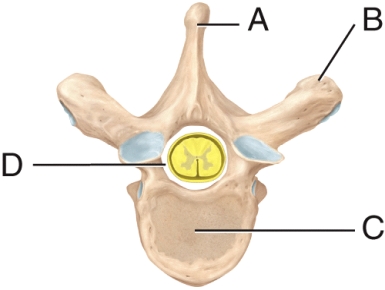
A) A
B) B
C) C
D) D

A) A
B) B
C) C
D) D

Unlock Deck
Unlock for access to all 75 flashcards in this deck.
Unlock Deck
k this deck
71
Which cranial bone does not contain a paranasal sinus? 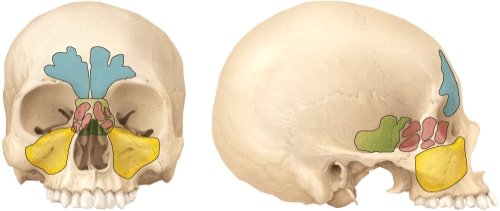
A) Sphenoid
B) Frontal
C) Ethmoid
D) Maxilla
E) Occipital

A) Sphenoid
B) Frontal
C) Ethmoid
D) Maxilla
E) Occipital

Unlock Deck
Unlock for access to all 75 flashcards in this deck.
Unlock Deck
k this deck
72
The depressions on the superior border of the manubrium are called the _____ notch and the _____ notches.

Unlock Deck
Unlock for access to all 75 flashcards in this deck.
Unlock Deck
k this deck
73
The label on the vertebral foramen is _____. 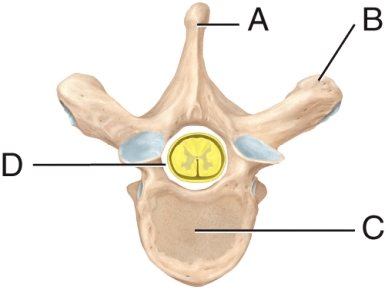
A) A
B) B
C) C
D) D

A) A
B) B
C) C
D) D

Unlock Deck
Unlock for access to all 75 flashcards in this deck.
Unlock Deck
k this deck
74
Which of the following exhibits an abnormal kyphotic curvature of the spine? 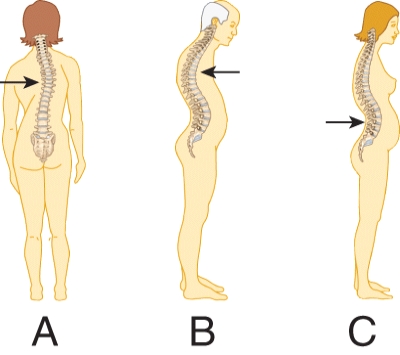
A) A
B) B
C) C

A) A
B) B
C) C

Unlock Deck
Unlock for access to all 75 flashcards in this deck.
Unlock Deck
k this deck
75
The primary curves of the vertebral column are the _____ and the _____ curves. They are curved so that they are anteriorly _____.

Unlock Deck
Unlock for access to all 75 flashcards in this deck.
Unlock Deck
k this deck



